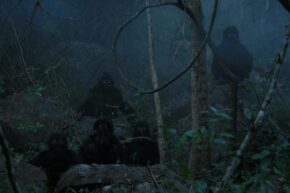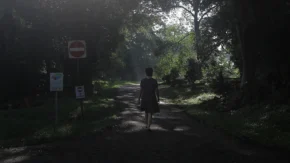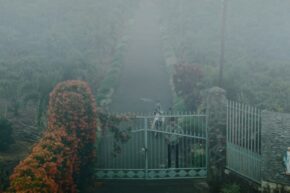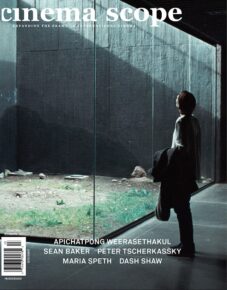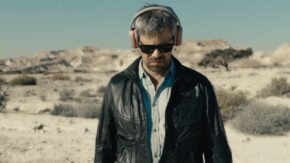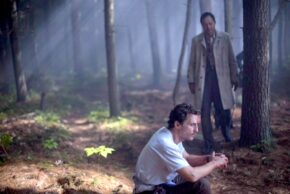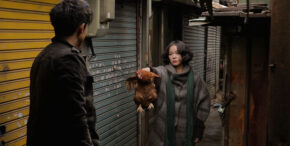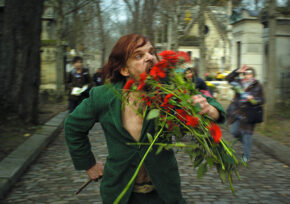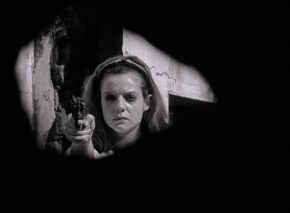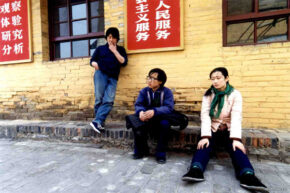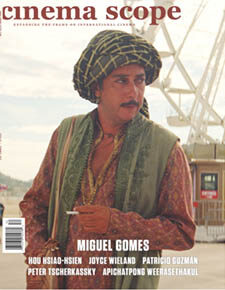Search Results: Apichatpong Weerasethakul
I Remember Everything: Apichatpong Weerasethakul’s Memoria
By Jordan Cronk | 09/20/2021 | CS88, From Cinema Scope Magazine, Interviews
Memoria arrives amidst a flurry of activity for the 51-year-old Thai filmmaker. In addition to the feature and the book, there’s Night Colonies, his contribution to the omnibus project The Year of the Everlasting Storm (which also premiered at Cannes); a solo exhibition of his video and installation work at the IAC Villeurbanne; and a career-spanning retrospective at FIDMarseille, where the director was on hand just days after Cannes to receive the festival’s Grand Prix d’Honneur.
Read More → TIFF 2021 | Memoria (Apichatpong Weerasethakul, Colombia/Thailand/ UK/France/Germany/Mexico)
By Jordan Cronk | 09/08/2021 | Cinema Scope Online, TIFF 2021, TIFF Coverage & Reviews
By Jordan Cronk Published in Cinema Scope #88 (Fall 2021) “When he came to, the present was almost intolerable in its richness and sharpness, as were his most distant and trivial memories…Now his perception and his memory were infallible.”—Jorge Luis Borges, “Funes the Memorious” Amongst the research materials, set photographs, email correspondence, and treatment excerpts…
Read More → TIFF 2015 | Cemetery of Splendour (Apichatpong Weerasethakul, UK/ France/ Germany/ Malaysia/ Thailand)—Masters
By Kong Rithdee | 09/09/2015 | Cinema Scope Online, TIFF 2015
By Kong Rithdee Originally published in Cinema Scope 63 (Summer 2015). Midway into Cemetery of Splendour, Jenjira Pongpas visits the Shrine of the Two Goddesses with her American husband to make offerings: she gives the goddesses a cheetah figurine for blessings on her bad leg, a gibbon for her strong limbs, and a tiger for…
Read More → Cemetery of Splendour (Apichatpong Weerasethakul, UK/France/Germany/Malaysia/Thailand)
By Kong Rithdee | 06/23/2015 | CS63, Festivals, From Cinema Scope Magazine, Spotlight
By Kong Rithdee Midway into Cemetery of Splendour, Jenjira Pongpas visits the Shrine of the Two Goddesses with her American husband to make offerings: she gives the goddesses a cheetah figurine for blessings on her bad leg, a gibbon for her strong limbs, and a tiger for the strength of her new son, Itt, one…
Read More → Apichatpong Weerasethakul
By Chuck Stephens | 04/04/2012 | 50 Best FIlmmakers Under 50, CS50, From Cinema Scope Magazine
By Chuck Stephens Apichatpong Weerasethakul may be on a first0name basis with more people on the planet than any other Cannes-prizewinning filmmaker in history, but no matter how “average” Joe—or Joei, as he’s more recently taken to transliterating his nickname—might seem to become, he never begins to lose his heavenly glow, his beatific gleam. When…
Read More → Spotlight | Ghost in the Machine: Apichatpong Weerasethakul’s Letter to Cinema
By Mark Peranson | 06/18/2010 | CS43, From Cinema Scope Magazine, Spotlight
By Mark Peranson and Kong Rithdee CINEMA SCOPE: Let’s begin by contextualizing Uncle Boonmee within the multi-platform Primitive project. The project seemed to be moving you in a more explicitly political direction. Even if in Uncle Boonmee, one can—and I do—argue that the politics is always there in the background, that the communists are always…
Read More → Out of Time: The Videos of Tulapop Saenjaroen
By Jesse Cumming | 01/18/2024 | Columns, CS97, Film - Art, From Cinema Scope Magazine
Few contemporary artists feel as attuned to late capitalism—and its insidious means of extracting both our time and resources—as Saenjaroen, whose works offer means of escape from or refutation of these forces.
Read More → TIFF 2023 | Inside the Yellow Cocoon Shell (Pham Thien An, Vietnam/Singapore/France/Spain) — Wavelengths
By Robert Koehler | 09/05/2023 | Cinema Scope Online, TIFF 2023
By Robert Koehler Published in Cinema Scope #95 (Summer 2023) Cinema has always had to defend itself against the pressures of business and capital, and yet, because filmmaking remains expensive (contrary to the false digital fantasies of “cheap” cameras), it is business and capital that continues to keep cinema going. This contradiction of conditions deepens when the…
Read More → Inside the Yellow Cocoon Shell (Pham Thien An, Vietnam/Singapore/France/Spain)
By Robert Koehler | 06/20/2023 | CS95, Festivals, From Cinema Scope Magazine, Spotlight
Cinema has always had to defend itself against the pressures of business and capital, and yet, because filmmaking remains expensive (contrary to the false digital fantasies of “cheap” cameras), it is business and capital that continues to keep cinema going. This contradiction of conditions deepens when the filmmaking takes place in a communist-governed nation like Vietnam, where capital operates (albeit sometimes uneasily) within a state-run system.
Read More → The Maiden (Graham Foy, Canada)
By Saffron Maeve | 01/10/2023 | Canadiana, CS93, From Cinema Scope Magazine, Spotlight
we don’t see anyone die in The Maiden, a ghost story wherein the dead are less gone than misplaced (even a lifeless cat appears to survive the cosmic wash cycle). While one may occasionally take issue with the film’s determinedly elliptical approach to its central subject, Foy always remains both formally and narratively fastened to the amorphous, ugly, and insoluble reality of grief.
Read More → CS90 Editor’s Note: Top Ten of ’21
By Mark Peranson | 03/21/2022 | Columns, CS90, From Cinema Scope Magazine, Top Ten
Every single one of the films listed in this year’s top ten premiered at a film festival in 2021, in particular, either Berlin (four), Cannes (both six in Official Selection and two in Quinzaine), or Venice (two). And not only did all the films premiere at festivals, but every single one of them also had a theatrical release in North America (or, in the case of Hong Sangsoo and a few others, will have one in 2022; as typical of recent years, 12 months cannot conceivably contain the Hong output for said year).
Read More → Cinema Scope Issue 88 Table of Contents
By Cinema Scope | 09/22/2021 | CS88, From Cinema Scope Magazine, Table of Contents
Interviews I Remember Everything: Apichatpong Weerasethakul’s Memoria by Jordan Cronk Do the Hustle: Sean Baker on Red Rocket by Blake Williams Cartooning Unlimited: Dash Shaw on Cryptozoo and Discipline by Sean Rogers Features To Sir, with Love: Maria Speth’s Mr. Bachmann and His Class by Michael Sicinski Next Stop Eternity Peter Tscherkassky’s Train Again and…
Read More → Issue 88 Editor’s Note
By Mark Peranson | 09/20/2021 | Columns, CS88, From Cinema Scope Magazine
After a year’s hiatus from the Croisette, we’re back with our first ever fall issue devoted to Cannes, which took place in July in the middle of a pandemic, in case you forgot. Because it was summer and travel was permitted, I followed the many, many movies I saw at Cannes with a relaxing vacation on a COVID-free, beach-heavy island, where the only film I watched was, appropriately, M. Night Shyamalan’s Old.
Read More → Cinema Scope 82: Editor’s Note — Best of the Decade
By Mark Peranson | 03/20/2020 | Columns, CS82, From Cinema Scope Magazine, Top Ten
And so goes the decade, and perhaps all of humanity as we know it—it was fun while it lasted. As a supplement to the Top Ten lists published here, which semi-scientifically summarize the privately expressed preferences of our regular contributors, I decided to do something a little different to glance back at the past ten years. By the time of publication you can find numerous examples of excellent writing on all of the films in our decade-end list, both in previous issues of Cinema Scope and also in other publications, in print and online, on the occasion of revisiting the past ten bountiful years in cinema.
Read More → For a Cinema of Bombardment
By Michael Sicinski | 09/23/2019 | CS80, Features, From Cinema Scope Magazine
Although there have always been intrepid critics and cinephiles who have engaged with films belonging to the non-narrative avant-garde, there has existed a perception that such films, operating as they do on somewhat different aesthetic precepts, could be considered a separate cinematic realm, one that even the most dutiful critic could engage with or not, as he or she saw fit.
Read More → Manta Ray (Phuttiphong Aroonpheng, Thailand/France) — Discovery
By Jennifer Lynde Barker | 09/09/2018 | Cinema Scope Online, TIFF 2018
By Jennifer Lynde Barker Manta Ray is a film about the Other and all that this philosophical, social, and ethical concept implies. The film strikes a graceful balance between the details of lived experience and a deeper symbolic scope, building the story quietly towards an encounter with the irreducible reality of Others and our responsibility…
Read More → Long Day’s Journey Into Night (Bi Gan, China/France) — Wavelengths
By Blake Williams | 09/01/2018 | Cinema Scope Online, TIFF 2018
By Blake Williams Published in Cinema Scope 75 (Summer 2018) “If the cinema isn’t made to express dreams or everything that in waking life has something in common with dreams, then it has no point.”—Antonin Artaud, “Sorcellerie et cinéma” (ca. 1928) Cinema, however realist it may ever strive to be, is synonymous with dreaming.…
Read More → Apt Pupil: Bi Gan on Long Day’s Journey Into Night
By Blake Williams | 07/01/2018 | CS75, From Cinema Scope Magazine, Interviews
By Blake Williams “If the cinema isn’t made to express dreams or everything that in waking life has something in common with dreams, then it has no point.”—Antonin Artaud, “Sorcellerie et cinéma” (ca. 1928) Cinema, however realist it may ever strive to be, is synonymous with dreaming. Fundamentally past-tense, after the fact; industrially and institutionally…
Read More → Sundance 2018: What’s the Story?
By Robert Koehler | 03/16/2018 | CS74, Festivals, From Cinema Scope Magazine
By Robert Koehler In Park City this January, all of those attending the Sundance Film Festival were told in no uncertain terms on a daily, if not hourly, basis that “the story lives in you.” The statement was right there on the cover of the catalogue, so dominant that it replaced the words—“Sundance Film Festival”—that…
Read More → Those You Call Mutants: The Films of Lucrecia Martel
By Blake Williams | 09/28/2017 | CS72, Features, From Cinema Scope Magazine
By Blake Williams “[Cinemas of the senses] generate worlds of mutating sounds and images that often ebb and flow between the figurative and the abstract, and where the human form, at least as a unified entity, easily loses its function as the main point of reference. One way or another, the cinema of sensation is…
Read More → The Seen and Unseen (Kamila Andini, Indonesia/Netherlands/ Australia/ Qatar) — Platform
By Michael Sicinski | 09/16/2017 | Cinema Scope Online, TIFF 2017
By Michael Sicinski The Seen and Unseen is a truly singular film, but it does not relinquish its secrets easily. The story of two young twins, the girl Tantri (Ni Kadek Thaly Titi Kasih) and the boy Tantra (Ida Bagus Putu Radithya Mahijasena), who share an intense emotional bond that may extend beyond death, The…
Read More → Zama (Lucrecia Martel, Argentina/Brazil/Spain/ France/Netherlands/Mexico/ Portugal/USA) — Masters
By Blake Williams | 09/04/2017 | Cinema Scope Online, TIFF 2017
By Blake Williams Published in Cinema Scope 72 (Fall 2017) “[Cinemas of the senses] generate worlds of mutating sounds and images that often ebb and flow between the figurative and the abstract, and where the human form, at least as a unified entity, easily loses its function as the main point of reference. One way…
Read More → Cannes at 70: Bad Times, Good Time
By Mark Peranson | 06/23/2017 | Columns, CS71, Festivals, From Cinema Scope Magazine, Spotlight
By Mark Peranson To celebrate its 70th anniversary, Cannes aggressively, yet clumsily, inserted itself into all kinds of contemporary debates over that age-old question: What is Cinema? The first answer to this question: the cinema is Cannes. On the organizational side, this was evident in the reworking of the festival trailer that runs prior to…
Read More → Toronto International Film Festival
By Cinema Scope | 09/01/2016
All TIFF 2014 TIFF 2015 TIFF 2016 TIFF 2017 TIFF 2018 TIFF 2019 TIFF 2020 TIFF 2021 TIFF 2021 | The Other Tom (Rodrigo Plá, Laura Santullo, Mexico/USA) By Angelo Muredda Single mom Elena (Julia Chavez) tries to do right by her scampish ten-year-old son Tom (Israel Rodríguez Bertorelli) despite the interventions of the byzantine…
Read More → Editor’s Note: The Cinema Scope Top Ten of 2015
By Mark Peranson | 03/21/2016 | Columns, CS66, From Cinema Scope Magazine, Top Ten
The Cinema Scope Top Ten of 2015 1. Cemetery of Splendour (Apichatpong Weerasethakul) 2. Arabian Nights (Miguel Gomes) 3. The Assassin (Hou Hsiao-hsien) 4. The Forbidden Room (Guy Maddin & Evan Johnson) 5. Right Now, Wrong Then (Hong Sangsoo) 6. Visit, or Memories and Confessions (Manoel de Oliveira) 7. Lost and Beautiful (Pietro Marcello) 8.…
Read More → Cannes 2015: My God, It’s Full of Stars!
By Mark Peranson | 06/23/2015 | CS63, Festivals, From Cinema Scope Magazine, Spotlight
By Mark Peranson Well, at least the weather was good. Every year another leak threatens to spring in the dam, but the Festival de Cannes is not going to die a death of a thousand, or even a million, cracks. I started to vomit up the Kool-Aid at least a decade ago, and harbour no…
Read More → Film/Art | Carlos Amorales, Roberto Bolaño, and Amorality Within the Avant-Garde
By Andrea Picard | 12/18/2014 | Columns, CS61, From Cinema Scope Magazine
By Andréa Picard “We dreamed of utopia and we woke up screaming.”—Roberto Bolaño, First Infrarealist Manifesto Last year, Vogue Paris published an issue devoted to the “avant-garde,” seemingly another instance of mainstream popular culture co-opting the language and ethos of radical art and politics. At a certain juncture, this would not have seemed so…
Read More → Pacifico’s Heights: Simone Rapisarda Casanova on The Creation of Meaning
By Jason Anderson | 09/16/2014 | CS60, From Cinema Scope Magazine, Interviews
By Jason Anderson Simone Rapisarda Casanova says that there is a Borges story so deeply embedded in his brain that only a lobotomy could remove it. Such a surgery would be suitably Borgesian in and of itself, but he should be safe from it in the meantime. The story, he explains, is “The Aleph,” a…
Read More → Master Shots: Tsai Ming-liang’s Late Digital Period
By Blake Williams | 08/30/2013 | CS56, Features, From Cinema Scope Magazine
By Blake Williams The title of Tsai Ming-liang’s tenth feature Stray Dogs bears a fairly conspicuous resemblance to a key metaphor from Laozi’s 6th-century Chinese philosophical text Tao Te Ching, which allegorizes man’s relationship with the heavens as that of a straw dog and the one who created it. Literally a dog-shaped figure made out…
Read More → Terrible Beauty: Yonah Lewis and Calvin Thomas’ The Oxbow Cure
By Jason Anderson | 08/22/2013 | Cinema Scope Online, Currency
By Jason Anderson Though feelings of fear and pain are palpable in almost every moment of The Oxbow Cure, a curious sense of exhilaration cuts through the frigid dead. Maybe that’s due to the co-directors’ Yonah Lewis and Calvin Thomas’ possible realization that they’ve managed to do something uncommonly brave within a Canadian system that…
Read More → Cannes 2013 | Only God Forgives (Nicolas Winding Refn, Denmark)
By Kong Rithdee | 06/24/2013 | CS55, Festivals, From Cinema Scope Magazine, Spotlight
By Kong Rithdee Handcuffed to Ryan Gosling in the nightmare that is my home city, let me walk you through the checklist. Elephant: Yes. Eastern mysticism: Yes. Muay Thai: Yes. Monks or monk-like figures: Yes. Nocturnal Bangkok in the claws of neon light, in a lesser-Lynch lurid trance: Yes. Flummoxed foreigners lost in a labyrinth:…
Read More → Opening the Gates of Night: Jean-Claude Brisseau’s La fille du nulle part
By Boris Nelepo | 12/16/2012 | CS53, Features, From Cinema Scope Magazine
By Boris Nelepo “I love to watch the stars. It’s one of those simple things that give me at least a remote idea of infinity along with some great poetry,” the ghost philosopher says in Jean-Claude Brisseau’s À l’aventure (2008), and Brisseau shares with his characters that same longing for the ineffable, as well as…
Read More → TIFF Day 10: Pieta x 13
By cscope2 | 09/15/2012 | Cinema Scope Online, TIFF 2012
Phil Coldiron I was planning on starting this little capsule by noting how I had never seen anything by Kim Ki-duk prior to this viewing. Turns out, I still haven’t; and given that, this obviously isn’t a review, or even really about Pieta at all. If you’re wondering, based on the thirty-some minutes that I…
Read More → TIFF Preview -3: autrement, la Molussie | Post Tenebras Lux | The Central Park Five | The Gatekeepers | A Hijacking | iLL Manors | Imagine | Kinshasa Kids | Mekong Hotel | Miss Lovely | Penance | To the Wonder
By cscope2 | 09/03/2012 | Cinema Scope Online, TIFF 2012
Cinema Scope 52 Preview Burru’s Abominable Dialectic: Nicolas Rey’s autrement, la Molussie (France)—Wavelengths By Michael Sicinski In composing this essay on Nicolas Rey’s latest film, I have opted to follow a principle similar to the one that gives his film its overall shape. The essay consists of six semi-autonomous sections, which I have assigned an…
Read More → CS51 Editor’s Note
By Mark Peranson | 06/24/2012 | Columns, CS51, From Cinema Scope Magazine
Editor’s Note Back to business as usual, which means being crabby about Cannes and printing long articles about filmmakers nobody has heard of. We’ll get to Cannes later on, with pieces dispersed throughout Issue 51 and also resting in the typical centre-square spotlight. For now I would rather devote my allotted space to some observations…
Read More → This Is Not an Omnibus: The Jeonju Digital Project 2012
By Michael Sicinski | 06/24/2012 | CS51, Features, From Cinema Scope Magazine
By Michael Sicinski Twelve years on, the Jeonju International Film Festival’s Digital Project is only getting stronger. This unique endeavour, whose history and raison d’être has been amply chronicled elsewhere (notably by James Bell in Sight & Sound,), remains impossible to pin down. While the JDP has generally remained focused on Asian directors, the project…
Read More → Issue 50: Table of Contents
By Cinema Scope | 04/20/2012 | CS50, Table of Contents
This is the complete list of articles from Cinema Scope issue 50. * Articles available online Features and Interviews *Film Criticism After Film Criticism: The J. Hoberman Affair by Mark Peranson *The Animal Equation by Denis Côté small roads, 103 minutes, 47 shots, 2011 by James Benning *Epinephrine, Man: The Cranked-Up Films of Neveldine/Taylor by…
Read More → Film Criticism After Film Criticism: The J. Hoberman Affair
By Mark Peranson | 04/18/2012 | CS50, From Cinema Scope Magazine, Interviews
By Mark Peranson In a subconscious sense, the impassioned cris de coeur that rippled through the internet following the shocking, but not surprising, dismissal of J. Hoberman from his position as senior film critic for the Village Voice on January 4, 2012, are evidence of an anxiety that springs from the changing nature of the…
Read More → CS50 Editor’s Note
By Mark Peranson | 04/04/2012 | Columns, CS50, From Cinema Scope Magazine
A crisis in film criticism does not exist, as film criticism has never been in such a vibrant, healthy state, and should really be reconfigured as a crisis signalling the end of modern media (e.g., the newspaper, the alt-weekly). When Cinema Scope was founded 13 years ago, the need for a printed fulcrum around which…
Read More → TIFF Day 5: Wavelengths
By Bart Testa | 09/12/2011 | Cinema Scope Online, TIFF 2011
By Bart Testa The Toronto International Film Festival’s experimental film series Wavelengths was begun by Cinematheque Ontario programmer Susan Oxtoby a decade ago as an outgrowth of her popular year-round Cinematheque series The Free Screen—and not of anything happening at TIFF itself, which has consistently displayed little interest in avant-garde films. Wavelengths continued with Oxtoby’s…
Read More → Global Discoveries on DVD: Auteurist and Non-Auteurist Shopping Tips
By Jonathan Rosenbaum | 06/29/2011 | Columns, CS47, From Cinema Scope Magazine
By Jonathan Rosenbaum If there’s any overarching lesson I learned from teaching film history to undergraduates over the past year in Richmond, Virginia (which, logistically speaking, is what obliged me to suspend this column for half a year), it’s that they know both less and more about history and film history than I did as…
Read More → CS46 Editor’s Note
By Mark Peranson | 03/12/2011 | Columns, CS46, From Cinema Scope Magazine
The Cinema Scope Top Ten of 2010 1. Uncle Boonmee Who Can Recall His Past Lives (Apichatpong Weerasethakul) 2. The Autobiography of Nicolae Ceaucescu (Andrei Ujica) 3. Mysteries of Lisbon (Raúl Ruiz) 4. Film Socialisme (Jean-Luc Godard) 5. Winter Vacation (Li Hongqi) 6. The Strange Case of Angelica (Manoel de Oliveira) 7. I Wish I…
Read More → Cinema Scope Top Ten of 2010
By cscope2 | 01/09/2011 | Cinema Scope Online
1. Uncle Boonmee Who Can Recall His Past Lives (Apichatpong Weerasethakul) 2. The Autobiography of Nicolae Ceaucescu (Andrei Ujica) 3. Mysteries of Lisbon (Raúl Ruiz) 4. Film Socialisme (Jean-Luc Godard) 5. Winter Vacation (Li Hongqi) 6. The Strange Case of Angelica (Manoel de Oliveira) 7. I Wish I Knew (Jia Zhangke) 8. Meek’s Cutoff (Kelly…
Read More → Spotlight | Cannes 2010: The Year We Made Contact
By Mark Peranson | 06/18/2010 | CS43, From Cinema Scope Magazine, Spotlight
By Mark Peranson As violent 30–foot waves were crashing along the shores of Nice and Cannes, destroying fancy beach-side restaurants and flooding the streets, the Icelandic volcano continued to spew airplane-averting ash into the lower atmosphere, wind gusts blowing the cloud closer and closer towards southwestern Europe; this oddsmaker listed Eyjafjallajokull as the early favourite…
Read More → Cinema Scope Top Ten Films of the Decade
By Cinema Scope | 03/18/2010 | CS42, The Decade In Review
1. Platform (Jia Zhangke, 2000) 2. In Vanda’s Room (Pedro Costa, 2001) 3. La libertad (Lisandro Alonso, 2001) 4. Los Angeles Plays Itself (Thom Andersen, 2003) 5. 13 Lakes (James Benning, 2004) 6. Evolution of a Filipino Family (Lav Diaz, 2004) 7. Yi Yi (Edward Yang, 2000) 8. Black Book (Paul Verhoeven, 2006) 9. Memories…
Read More → Columns | Film Art | Orphans and Maniacs: Chantal Akerman’s Maniac Summer
By Andrea Picard | 03/17/2010 | Columns, CS42, From Cinema Scope Magazine
By Andréa Picard Whether ironic, playful or slightly self-deprecating, the title of Chantal Akerman’s Maniac Summer, recently exhibited at the Marion Goodman gallery in Paris is apt, bemusing, and applicable to many of her other works—at least the maniac part. Pathology is Akerman’s specialty, as she consistently delves into a cinema of solipsism, not unlike…
Read More → The Decade in Review | C.W. Winter
By C.W. Winter | 03/16/2010 | CS42, The Decade In Review
It’s not often that one would write about a film while it’s still in the middle of its first screening. But as it turns out, one of my favourite movies of this decade—a movie that’s also one of my favourites of the ‘90s, ‘80s, and ‘70s—offers no other choice. I’m speaking of Tony Conrad’s Yellow…
Read More → The Decade in Review | Jennifer Reeves
By Jennifer Reeves | 03/16/2010 | CS42, The Decade In Review
Every contender for a “best-of” list should be seen more than once. First impressions aren’t always what they’re cracked up to be. And if you care about accuracy and fairness, films not commercially distributed should be given as much consideration as widely available ones. As I was unable to view all of my “contenders” multiple…
Read More → Columns | Editor’s Note
By Mark Peranson | 09/04/2009 | Columns
By Mark Peranson It’s all over the map again for Issue 30 (is it really Issue 30? how ever did that happen?), and by that I mean both geographically as well as polemically. Halfway through editing this issue, I thought that it might be a good idea to commission even more opinionated pieces and just…
Read More → Features | Songs Sung Blue: The Films of Michael Robinson
By Michael Sicinski | 09/01/2009 | From Cinema Scope Magazine
By Michael Sicinski We’d been to paradise, but we’d never been to Me After the grand phenomenological projects of Stan Brakhage and Gregory Markopoulos, the encyclopedic conceptualism of Michael Snow and Hollis Frampton, and the grand syntagmatiques of Yvonne Rainer and mid-to-late Jean-Luc Godard, the going line in experimental film and video criticism was that…
Read More → Columns | Global Discoveries on DVD: 20 Labels and Four Outlets
By Jonathan Rosenbaum | 08/31/2009 | Columns
By Jonathan Rosenbaum Anna Biller. If you’re looking for something different and agreeably deranged, go directly to www.lifeofastar.com/purchase.html, where for $19.95 you can purchase Anna Biller: The Short Film Collection, made between 1994 and 2001—four of the strangest films you’ll ever see. I suppose this writer-director-star-set-and-costume-designer could be called a slick Jack Smith, but that’s…
Read More → Issue 63 Table of Contents
By Cinema Scope | 06/23/2015 | CS63, From Cinema Scope Magazine, Table of Contents
Christian Petzold’s Phoenix, Andrei Konchalovsky’s The Postman’s White Nights, Peter Strickland on The Duke of Burgundy and more...
Read More → 



